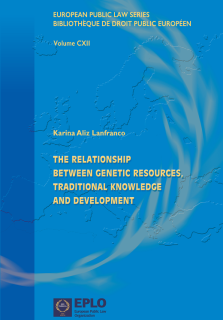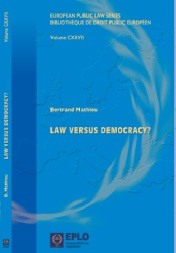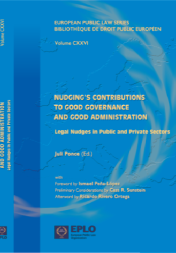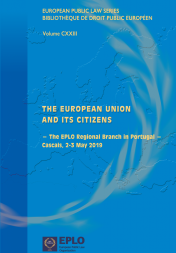
European Public Law Series, vol. CXII, Karina Aliz Lanfranco, The Relationship between Genetic Resources, Traditional Knowledge and Development, 245 pp., ISSN: 2308-8648, ISBN: 978-618-81128-6-5
This book studies the legal treatment of the relationship between genetic resources, traditional knowledge and development. It establishes that the genetic resources of the countries that have been used for hundreds of years should be protected by the patent system. In this context, genetic resources are defined and historically summarized and the laws used in some developing countries and in some developed countries are explained. The legal treatment given under international agreements is also analyzed. The argument of the book is defended by examining the interrelation between national sovereignty and private property. The concept of sovereignty leads to the core of this book's proposal: Legal measures should be taken in order to make sure that the exploitation of the genetic resources and of the traditional methods would lead neither to their extinction nor to their extraction from those who are dependent on them or need them most. The book ends with a detailed presentation of and argumentation on the author's main thesis, which is, as already mentioned, to enforce a proper instrument of international law for the protection of genetic resources and, even more, to create an international organization with the sole or main aim to protect genetic resources and traditional knowledge.
The author of this book, Dr. Karina Aliz Lanfranco, is a PhD holder of the Law School of the National and Kapodistrian University of Athens. This book was defended as PhD thesis before the relevant jury of the Athens University Law School on July 3, 2013. She is a Law graduate of the Pontificia Universidad Católica of Peru and holds a Master's degree in Law and Economics of the Utrecht University, in the Netherlands. She has actively participated in the academic and scientific work of the European Public Law Organization. Her research is on the areas of genetic resources, traditional knowledge and development from a law and economics perspective. She teaches courses in corporate law at the Universidad Peruana de Ciencias Aplicadas (UPC) and she is sub-legal manager in a Peruvian company.
TABLE OF CONTENTS
PART I: INTRODUCTORY CHAPTER: GENETIC RESOURCES AND TRADITIONAL KNOWLEDGE: THE PARTICULAR RELEVANCE OF THEIR SPECIFIC LEGAL (AND POLITICAL) TREATMENT
1.1 Genetic Resources and Traditional Knowledge: The Meaning of the Concepts and their Particular Importance for Developing Countries
1.2 National Sovereignty and Private Property: The Interrelationship between Them and their Relationship with Development. "The Tragedy of the Commons"
1.3 Intellectual Property Law: An Instrument of Protection or an Instrument of "Destruction" of Genetic Resources and Traditional Knowledge?
PART II: APPROACHES IN NATIONAL LEGISLATION
Chapter 1: Peru
1.1 The Content of the Legislation
1.2 Possible Effects on Trade
1.3 Possible Market Failures Induced by the Regulations
Chapter 2: CAN
2.1 The Content of the Legislation
2.2 Possible Effects on Trade
2.3 Possible Market Failures Induced by the Regulations
Chapter 3: The European Union
3.1 The Content of the Legislation
3.2 Possible Effects on Trade
3.3 Possible Market Failures Induced by the Regulations
Chapter 4: India
4.1 The Content of the Legislation
4.2 Possible Effects on Trade
4.3 Possible Market Failures Induced by the Regulations
Chapter 5: United States
5.1 The Content of the Legislation
5.2 Possible Effects on Trade
5.3 Possible Market Failures Induced by the Regulations
Chapter 6: Differences and Similarities between the National Approaches Presented. Comparative Remarks
PART III: APPROACHES IN INTERNATIONAL LEGISLATION
Chapter 1: CBD
1.1 The Content of the Legislation
1.2 Possible Effects on Trade
1.3 Possible Market Failures Induced by the Regulations
Chapter 2: FAO
2.1 Regulations Used
2.2 Possible Effects on Trade
2.3 Possible Market Failures Induced by the Regulations
Chapter 3: UNESCO
3.1 Regulations Used
3.2 Possible Effects on Trade
3.3 Possible Market Failures Induced by the Regulations
Chapter 4:WIPO
4.1 Regulations Used
4.2 Possible Effects on Trade
4.3 Possible Market Failures Induced by the Regulations
Chapter 5: WTO
5.1 The Content of the Legislation
5.2 Possible Effects on Trade
5.3 Possible Market Failures Induced by the Regulations
PART IV: COMPARISONS, CONCLUDING REMARKS AND CRITICISM
Chapter 1: A Paradigm of Bilateral International Legislation: FTA between Peru and the United States and the Regulations Covering Genetic Resources and Traditional Knowledge
1.1 Background of the FTA
1.2 Treatment under the FTA between Peru and the US
1.3 Special Understanding regarding Biodiversity and Traditional Knowledge
1.4 Intellectual Property Rights
Chapter 2: Concluding Remarks and Criticism
2.1 Critical Remarks: The Shortcomings of the Current Legislation: Differences between Applicable Laws and Forums at the International Level
2.2 The Role that the WTO Should Play in the Protection of Genetic Resources and Traditional Knowledge in the Future. Is this a Matter of Differences?
Chapter 3: Concluding Suggestions
3.1 General Outline of a Better, Fairer and More Just International Regulation/Legislation of Genetic Resources/Traditional Knowledge, in particular in the Less or Least Developed Countries
3.2 Political or Legal/Political Priorities that should be Taken into Account when Negotiating and Before Signing a Free Trade Agreement. If the International Regimes are Inadequate, is this Because Those Responsible for them have Not Studied Enough Law or Because they have Other/Diverging Priorities?
BIBLIOGRAPHY





















